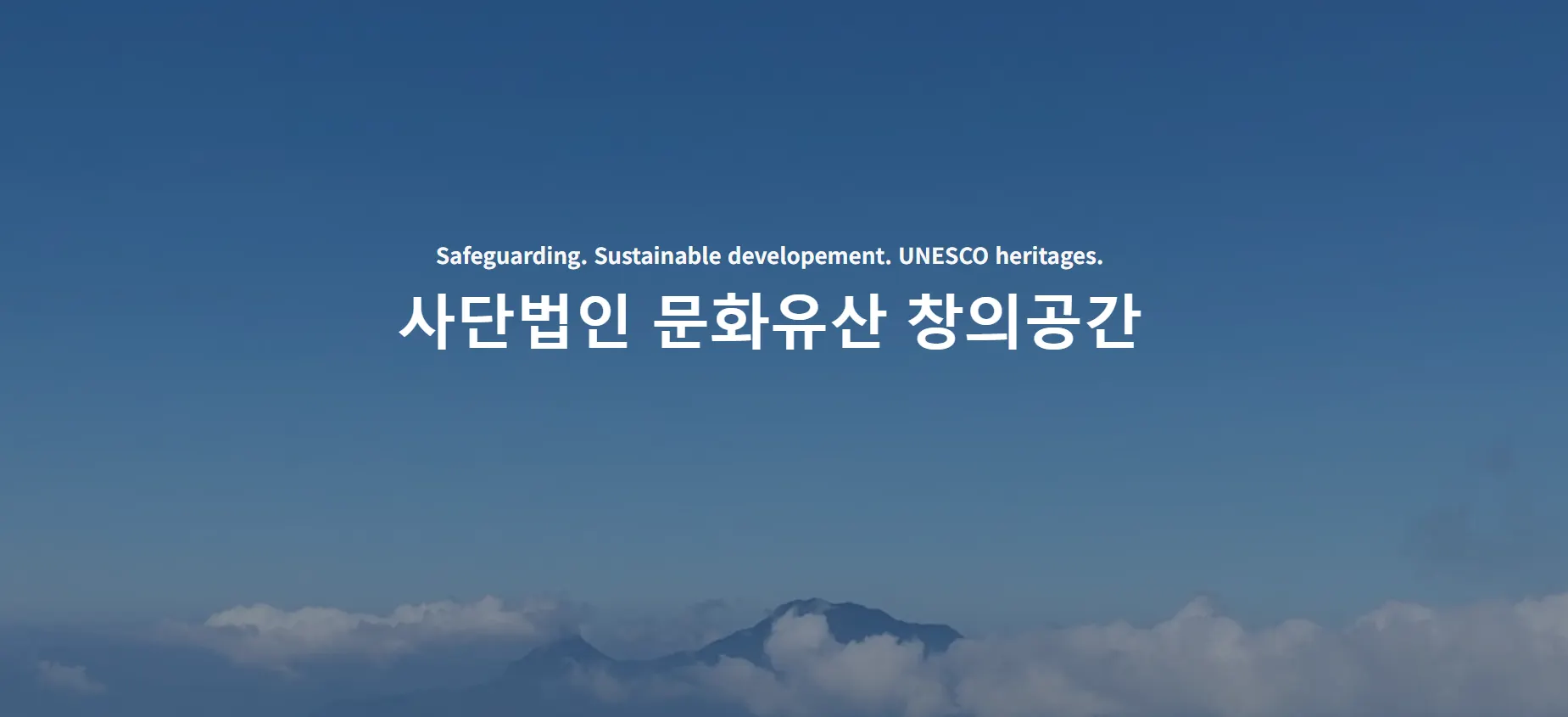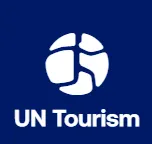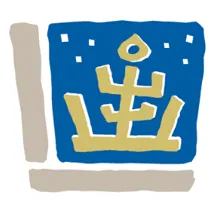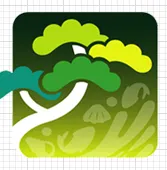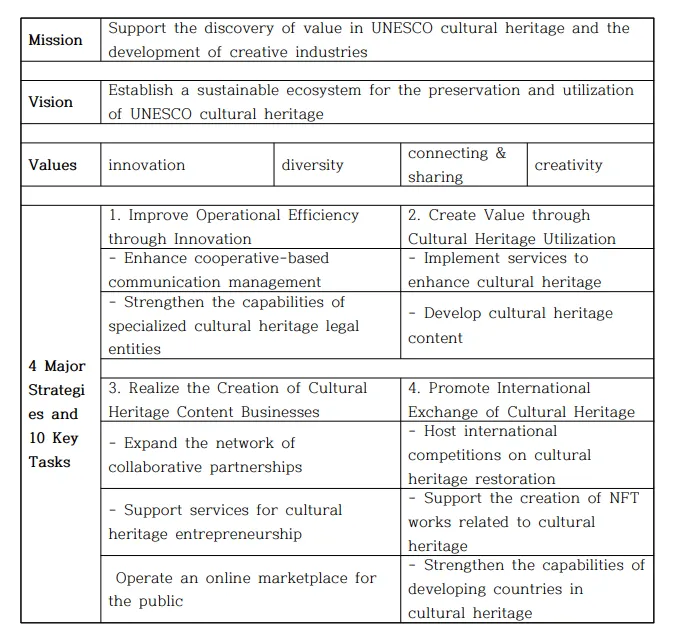•
We are an expert institution specializing in UNESCO, cultural heritage, tourism, ASEAN, and international development cooperation.
•
We contribute to improving the quality of life for youth in developing countries and promoting sustainable development.
•
Based on Web 3.0 values, we welcome the sharing, connection, and collaboration of knowledge and experiences.
진행중 사업 / Ongoing Projects
진행된 사업 / Completed Projects
파트너를 구하는 프로젝트 / Projects Seeking Partners
유관 활동 / Related Activities
Manifesto
The Cultural Heritage Creativity Lab aims to contribute to the development of the creative industry
We aim to establish a foundation that utilizes a wide array of cultural resources, including UNESCO World Heritage sites, intangible heritage, and documentary heritage, both locally and globally. Additionally, we seek to transform cultural assets held by government agencies, public institutions, research entities, cultural exchange organizations, and UNESCO-related bodies—each with cultural expertise—into dynamic cultural content. This transformation will occur through creation, production, exhibitions, and performances that enliven everyday life.
The core values of the Cultural Heritage Creativity Lab are connection and sharing
Believing that creativity arises from connection, we seek to foster communication across various cultural heritage genres and explore new connections with the creative industries. Recognizing community members as key agents in the transmission and development of cultural heritage, we explore ways to reinvest profits generated from content and tourism industries—created through shared efforts among these members—back into the community. Ultimately, the Creative Lab strives to promote cultural heritage preservation and sustainable development by raising awareness of cultural heritage as a resource for creative industries and by implementing Web 3.0 values, where profits from connecting and sharing cultural heritage are distributed among community members.
The main activities of the Cultural Heritage Creativity Lab are as follows:
Research, investigation, publication, and consulting related to UNESCO heritage listings and the Creative Cities Network
Activities connecting cultural heritage with the content and tourism industries
Creation and production of content that combines cultural heritage with blockchain technologies such as NFTs
Establishment of an online marketplace for UNESCO cultural heritage, including high-quality craft products
Capacity-building support for developing countries for the protection and development of cultural heritage
Collaborative activities with UNESCO, Category I & II institutes, National Commissions, NGOs, Creative Cities, and National Committees
Commissioned and subsidized projects carried out in cooperation with international organizations, national governments, local governments, and public institutions
Support for entrepreneurship, education, and promotional activities for the youth, focusing on content creation and production utilizing cultural heritage.
Goals and Tasks
Introduction
Legal Name: Cultural Heritage Creativity Lab Association
Purpose of Establishment: To protect cultural heritage and implement sustainable development models
Foundation Basis: Article 32 of the Civil Act and Article 4 of the "Regulations on the Establishment and Supervision of Non-profit Corporations under the Jurisdiction of the Ministry of Culture, Sports and Tourism and the Cultural Heritage Administration"
Registration Authority: Korea Heritage Service ( ex. National Heritage Administration)
Progress
The Cultural Heritage Creativity Lab was initiated by representatives and experts from organizations like the UNESCO ICHCAP, UNESCO World Heritage International Interpretation Center, UNESCO International Documentary Heritage Center, World Martial Arts Union, International eSports Committee, Current Korea, Incutek, KAIST professors, professors from the Korean National University of Cultural Heritage, former director of the National Folk Museum, and public notaries. In April 2022, it was approved as a non-profit corporation by the Cultural Heritage Administration.
Director
Mr. Keum Gi Hyung, an adjunct professor at the Korean National University of Cultural Heritage, was appointed as the CEO. Director Keum has served as the Director General of the UNESCO Asia-Pacific Intangible Heritage Center(ICHCAP), Head of the UNESCO World Heritage International Interpretation Center Eastablishment TFT(WHIPIC), member of the UNESCO Korean Commission, and UNESCO Asia-Pacific Cultural Expert (P4). He has also held roles such as Director-General of Tourism Policy Bureau at the Ministry of Culture, Sports and Tourism, DG of PR Policy Bureau, Game Division DG of the 2015 Summer Universiade Games Headquarters, Director of the Korean Cultural Center in Vietnam, and he continues to serve as a policy consultant, evaluator, and advisor for central ministries, local governments, and public institutions.
Members
High-ranking officials of the Ministry of Culture, Sports and Tourism and the Korea Heritage Service, representatives and senior staff of UNESCO Korean Committee and all fields of culture, science, and education Category II centers, senior researchers of public research institutions, representatives of cultural and arts public institutions, regional cultural foundation representatives, PR consulting firm representatives, cultural enterprise representatives, marketing research organizations, non-profit foundation corporations, digital asset experts, ODA specialist professors, digital heritage specialist professors, cultural property, and national heritage experts, graduate students from the Korean National University of Cultural Heritage and the University of Pennsylvania, lawyers, and other experts in culture, arts, tourism, cultural assets, PR, UNESCO international cooperation, ODA, regional studies, blockchain, and urban regeneration participate as dues-paying members.
12-Minute Presentation: An Introduction to Cultural Heritage Creativity Lab (CHL)
Good morning distinguished guests and colleagues,
I am deeply honored to have this opportunity to share with you the story and mission of the Cultural Heritage Creativity Lab, a thoughtful initiative born from our collective dedication to cultural heritage preservation and development.
Our Foundation
The Cultural Heritage Creativity Lab emerged from a shared vision among some of Korea's most experienced cultural heritage professionals. We were fortunate to receive recognition as a non-profit organization under the Korea Heritage Service in April 2022, allowing us to pursue our mission of connecting traditional heritage with contemporary innovation.
Our Distinguished Team
We are particularly grateful to have assembled a remarkable group of professionals whose expertise spans multiple disciplines:
•
Our leadership includes Mr. Keum Gi Hyung, former Director General of UNESCO ICHCAP and an adjunct professor at the Korean National University of Cultural Heritage, who brings decades of experience in cultural heritage management and international cooperation
•
Our members include senior researchers from UNESCO Category II centers, who contribute valuable insights into world heritage preservation and international cooperation
•
We benefit from the expertise of professors from KAIST and the Korean National University of Cultural Heritage, bringing both technological innovation and traditional heritage perspectives
•
Our team includes former directors of national museums and cultural institutions, offering deep understanding of cultural asset management and public engagement
Our Collaborative Approach
We believe in three fundamental principles that guide our work:
•
Thoughtful Integration: Carefully bridging traditional cultural practices with contemporary innovations
•
Community-Centered Development: Ensuring that communities remain at the heart of cultural heritage preservation
•
Knowledge Sharing: Creating platforms for the exchange of expertise and experiences
Current Initiatives
Our ongoing projects reflect the depth and breadth of our expertise:
•
A comprehensive publication on cultural heritage and international development cooperation, drawing on our members' extensive experience in ODA projects
•
Research into the intersection of intangible cultural heritage and contemporary fashion, led by our cultural heritage experts
•
Development of innovative platforms for cultural tourism, combining traditional knowledge with modern technology
International Collaboration
Our international initiatives include:
•
Partnerships with UNESCO-affiliated institutions worldwide
•
Cultural exchange projects, such as our Korea-Vietnam Contemporary Art Exchange
•
Capacity-building programs for developing countries in cultural heritage management
Future Vision
Looking ahead, we aim to:
•
Establish sustainable models for cultural heritage preservation that benefit local communities
•
Create innovative platforms for sharing cultural heritage knowledge
•
Support the next generation of cultural heritage professionals
•
Strengthen international networks for cultural heritage preservation
Our Commitment
While we are proud of our team's expertise and achievements, we remain humble in our approach, recognizing that cultural heritage preservation is a collective responsibility that requires continuous learning and adaptation.
We see ourselves as facilitators, working to connect the deep knowledge of traditional culture bearers with contemporary approaches to heritage preservation and development.
Invitation for Collaboration
We welcome opportunities to learn from and collaborate with others who share our commitment to cultural heritage preservation. Your insights and experiences would be invaluable in helping us better serve our mission.
Thank you for your kind attention. I would be grateful to address any questions you may have about our organization and our work.
Note: This presentation is designed for a 12-minute delivery, allowing time for emphasis on key points and transitions.

